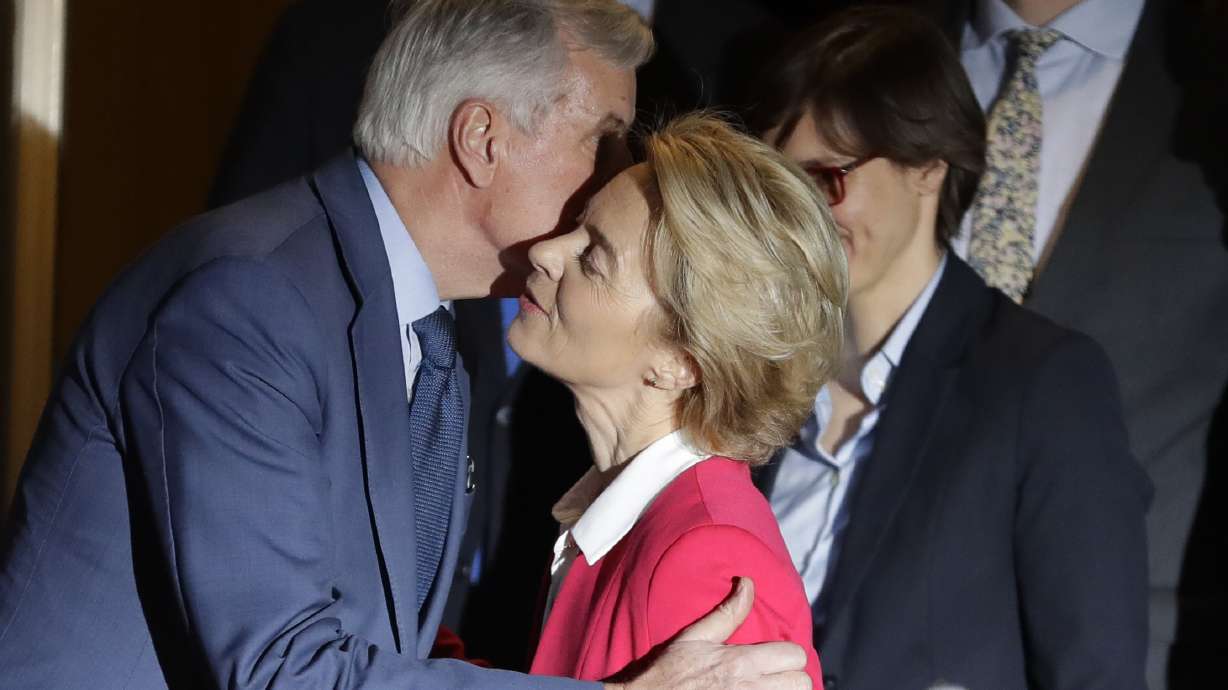Estimated read time: 3-4 minutes
This archived news story is available only for your personal, non-commercial use. Information in the story may be outdated or superseded by additional information. Reading or replaying the story in its archived form does not constitute a republication of the story.
BRUSSELS (AP) — France made it clear Friday that it does not want to be shackled to the tight deadline British Prime Minister Boris Johnson is seeking to impose for the upcoming free trade talks between Britain and the European Union.
Johnson has said discussions about the future must be completed by the end of 2020 and that there is ample time to agree a wide-ranging deal.
France's EU minister was skeptical and said it could take three times longer.
Amelie de Montchalin said EU member states would bide their time even if that risks causing a chaotic no-deal transition at the end of the year.
“If Boris Johnson says it must end in 11 months from now and we need 15, 24 or 36 months, the 27 will take their time,” she said.
It has already taken the U.K. more than 3 1/2 years to leave the EU following its June 2016 Brexit referendum.
Britain is scheduled to leave the EU on Jan. 31 at which point it enters a standstill period whereby it remains within the European single market and customs union until the end of 2020. After Brexit day, official discussions are set to begin on the future relationship between Britain and the EU - since the Brexit vote in June 2016, discussions have only centered on aspects related to the divorce such as citizens' rights and Britain's financial liability.
Forging a comprehensive free trade agreement between the EU and a third country usually talks years, not months, and Johnson's timeline is viewed as unrealistic across the bloc.
The European Commission has said it might be possible to tackle some selected items in 2020, such as fishing rights, but that comprehensive discussions from trade to security would need longer.
French President Emmanuel Macron said earlier this week that in light of Johnson's insistence that negotiations on the future have to be over by the year's end, Britain will need to show “flexibility in line with that ambitious schedule."
EU officials have also warned that negotiations will be made harder by the British government's insistence that it won't agree to keep EU rules and standards as they develop. Johnson has said he wants Britain to be free to diverge from EU regulations in order to strike new trade deals around the world. The EU has responded by pointing out that good access to the bloc's single market, the world's biggest, only comes if Britain agrees to maintain a level playing field on such issues as environmental standards and workers rights.
If there is no deal when the U.K. transition deadline ends at the start of 2021, then Britain would leave the EU's economic arrangements with no deal, a development that would see tariffs and other impediments slapped on trade and potentially sink the British economy into recession.
Britain and the EU will have to strike deals on everything from trade in goods and services to fishing, aviation, medicines and security. The EU has said both sides would suffer — but that Britain would suffer more given the relative importance of the EU economy to the size of the British economy.
“It is a major arm twisting game,” de Montchalin said.
Without doubt, the most difficult issue during the Brexit divorce discussions was how to maintain a free and open border between EU member Ireland and Northern Ireland, which is part of the EU. That issue was complicated further by the fact there had been no functioning devolved administration in Northern Ireland for three years.
However, t he looming Brexit date appears to have given new urgency to attempts to restore the Northern Ireland Assembly and executives. Political parties there were considering Friday a draft deal from the British and Irish governments to revive the Northern Ireland Assembly and executive.
The two governments urged the main pro-British and Irish nationalist parties to accept the deal. Northern Ireland's 1.8 million people have been without a functioning administration since the power-sharing government collapsed in January 2017.
___
Sylvie Corbet contributed from Paris; Lawless reported from London
Copyright © The Associated Press. All rights reserved. This material may not be published, broadcast, rewritten or redistributed.









